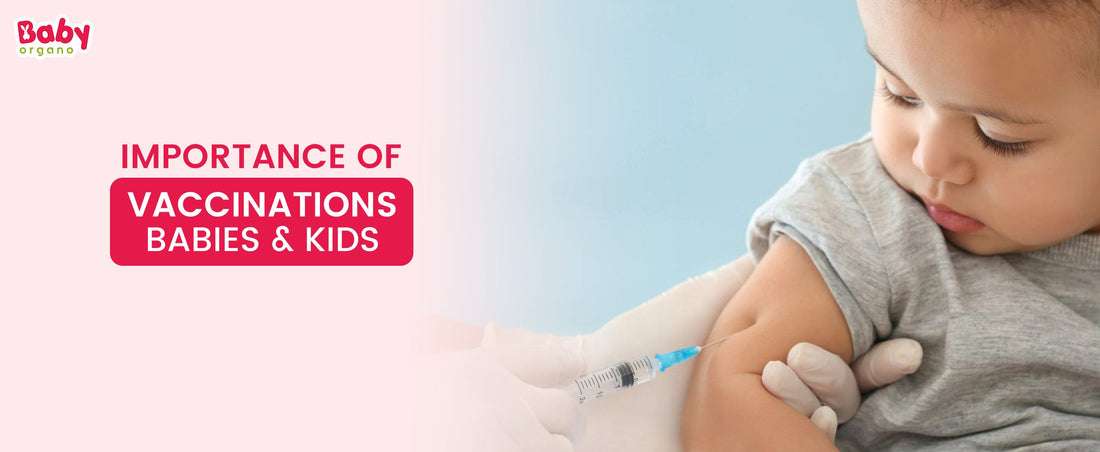
Important Baby Vaccinations: Every Parent Should Know
- by Dr. Urvi Ashani
- 2 min 22 sec
Table of Contents
Welcoming your little one into your life is one of the most heartwarming moments for you as parents. The first time those tiny hands hold your little finger, you promise to care for their health and wellness. Along with your love, your newborn needs a powerful dose of baby vaccinations to protect their delicate bodies from life-threatening diseases.
Vaccines help boost their immunity and prevent severe infections that can cause immediate or long-term health issues. However, parents often have concerns and questions about which vaccinations are necessary and when to get them
In this blog, we will break down the vaccination required for infants according to the vaccination schedule in India, debunk the usual myths, and provide helpful suggestions to make the vaccination process smooth. So, let’s check them out:
Why is the child's vaccination important?
Newborn babies have weak immunity and developing body systems. This makes them a soft target for becoming victims of mild and severe health problems. Vaccination is a trusted tool to strengthen the body’s defense system so it can fight against diseases. The list below will help you understand the importance of vaccines in a baby’s life:
Prevents serious illnesses:
Vaccination at the right time and age can help prevent serious health risks such as polio, measles, and hepatitis, which can have lifelong complications for your child.
Boost immunity:
Children are born with weak immunity as their body systems continue to develop as they grow. Through vaccines, you can enhance their natural immunity to fight disease-causing pathogens.
Fewer mass spreads:
When children in large numbers are vaccinated, it creates herd immunity. Eventually, this results in fewer mass outbreaks of diseases in the community.
Saves medical expenses:
The medical charges in India can go up to lakhs for certain treatments. Giving necessary vaccines at the right time can help reduce the risk of diseases and protect your little one without excessive spending.
With scheduled vaccination, you can safeguard your newborn against preventable diseases for their lifetime. In the next section, we have provided a detailed list of all the important baby vaccines that are essential for good health:
Essential child vaccination
The Indian Academy of Pediatrics (IAP) and the Government of India recommend a vaccination schedule that begins at birth and continues into older years. Here is the breakdown of the necessary vaccines:

Common Concerns and Myths About Vaccines
Besides the pain of watching their baby in tears, there are certain misconceptions about vaccines in most parents, which stop them from following the schedule. Let’s debunk some of the most common myths:
Myth: "Breastfeeding helps in preventing infections, so vaccines aren’t necessary."
Fact: Breastfeeding improves immunity. However, it doesn’t guard your little one against serious diseases like measles, polio, or hepatitis. They need vaccines to stay safe from these issues.
Myth: "Vaccinated children don’t get sick at all.”
Fact: Vaccines do not guarantee 100% immunity. They help reduce the severity of a disease if your child gets infected.
Myth: "Too many vaccines can overwhelm a baby’s immune system."
Fact: Babies are exposed to thousands of germs daily. Vaccines contain only a fraction of what their immune system handles naturally.
Myth: "Vaccines have harmful side effects."
Fact: Most vaccine side effects, like mild fever or swelling, are temporary and far less severe than the diseases they prevent.
Myth: “You don’t need vaccines for diseases like polio and measles that have been eradicated.”
Fact: These diseases might be out of India, but they are still prevalent in other countries. Not giving their vaccines poses a risk of an outbreak.
Tips for Parents to Ensure a Smooth Vaccination Process
Getting your baby vaccinated doesn’t have to be a stressful experience. Here are some helpful tips:
Stay informed: Keep a vaccination schedule and mark important dates.
Prepare your baby: Hold them close in your arms and say comforting words to them during the shot.
Manage post-vaccination discomfort: Use a cold compress to ease swelling and consult your doctor if the fever persists.
Choose a reliable clinic: Ensure a certified healthcare provider administers vaccinations.
Stay calm: Babies can sense your anxiety and reciprocate it. As parents, try to control your stress and remain relaxed.
Final Thoughts
Children’s vaccination is essential in protecting them from life-threatening diseases. Adhering to the vaccination schedule prescribed by health experts ensures immunity develops at every growth stage—just like using trusted baby & kids care products safeguards their daily well-being.
While concerns and myths about vaccines exist, scientific evidence proves that they are safe and necessary. This article is an attempt to introduce you to the world of baby vaccination. As a parent, understanding the various vaccines and preparing for them is important for a smooth process.
By ensuring timely vaccination, you are giving the best defense against preventable diseases, paving the way for a healthy future. Enjoy happiness with disease-free wellness.
Frequently Asked Questions
1. How can I prepare my baby for a vaccine?
You can prepare your baby by keeping them comfortable, ensuring they are well-fed before the appointment, and soothing them during and after the shot. Distractions like toys or pacifiers can also help.
2. Do vaccines hurt?
Yes, but only slightly. Babies may feel a quick pinch, but the discomfort is temporary. You can comfort them by holding them or Breastfeeding them right after the shot.
3. What is the 5-in-1 vaccine for babies in India?
The 5-in-1 vaccine, also known as the Pentavalent vaccine, protects against five diseases: diphtheria, pertussis (whooping cough), tetanus, hepatitis B, and Haemophilus influenzae type B (Hib).
4. Which vaccination is necessary for a baby?
All vaccines in the immunization schedule are necessary, including BCG, DTP, Hepatitis B, IPV, MMR, Rotavirus, PCV, and others. These protect against serious illnesses.
- Tags:
- Parenting tips


